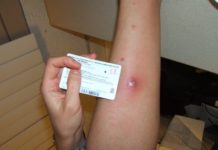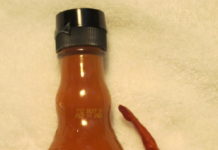by Fowzia Osman, Rockwood Summit High School (Fenton, MO)
Somalia, located in eastern Africa in a region called “the horn of Africa,” is a

country that has experienced 40 years of civil unrest. Since 1992, Somalia has had a significant amount of migration to North America. US Department of Homeland Security reports that there are now an estimated 70,000 to 200,000 Somali-Americans. With this migration, the immigrants have developed diabetes. My family is of Somali and Yemeni decent. Therefore, I have experienced firsthand the effects of immigration.
My mom’s family, who are primarily Yeminis, lived in the capital of Somalia, Mogadishu. Since Mogadishu is a coastal city, their diet was essentially sea based. My mom stated that, “there were no refrigerators, so we caught our food the same day and ate it fresh.” Having no refrigerators eliminated the availability of processed foods.
My aunt, who is related to me on my mom’s side, developed diabetes and high blood pressure. “When I went to Europe there was just so many different types of chocolate, I wanted to try them all,” she states. My aunt is an extremely healthy person and makes wise choices. She has even influenced my family to make healthier choices ever since she developed type two diabetes three years ago.
Diabetes is a condition in which the amount of glucose in the blood is high, because the body does not produce enough insulin. Insulin is necessary for the body to break down glucose in order to use it for energy. This condition is developed from either heredity or formed from unhealthy food consumption. The type of diabetes my aunt has is type two, and developed because immigrants are used to healthier foods. Therefore, the refugees in the western world are more prone to diabetes and other risks.
But my aunt is not alone, because a 2010 study published in the Canadian Medical Association Journal, which examined around 1.1 million Canadian immigrants, found that those from Africa had twice the risk of developing diabetes compared to long-term residents or immigrants from Europe or North America. This is the result of the extensive lifestyle changes and contributed to the risk of long-term diabetes.
The article in the Canadian Medical Association Journal also suggests that, among several risk factors, the lower standard of living for immigrants has a direct relationship with increasing the risk of diabetes.. If a person is used to eating fresh, healthy, and non-processed foods, as well as walking everywhere, and moves to an environment where processed food is extremely common, the body receives extra sugars that it is not used to.
My aunt says, “it is bothersome that I cannot eat any Swedish chocolate my brother sends me from Europe or eat a Hersey bar or even eat halwa [a Somali food that is gelatinous and pure sugar]. But I have to deal with it, and I am glad that I have helped my cousin and her children to become more health conscious.”
| Related stories: Living with a Diabetic Dad, Cause and Effects of Diabetes |
For now, my aunt–the healthiest person I know–lives with type two diabetes, a disease that is normally a consequence of obesity, inactivity, poor diet and aging. Fowzia Osman

This work is licensed under a Creative Commons Attribution-NonCommercial-NoDerivs 3.0 Unported License














This is so interesting! Thanks for writing this article. You did a great job of using credible sources and attributing your facts to them, and you also chose an extremely relevant topic for people in the Saint Louis area since we have so many foreign refugees. Well done!
This is a lovely article. It is fascinating to read a student’s piece about science that is directly related to her personal experience. It is particularly interesting that Fowzia regards her aunt as "the healthiest person I know" even though she has type two diabetes. Why? Because she has the self-discipline to look after herself. I wish our students here in Buffalo could write for SciJourner.
Thanks for the positive feedback! :gamba